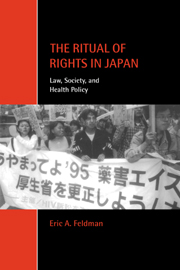Book contents
- Frontmatter
- Contents
- Preface
- Acknowledgments
- 1 Reconsidering rights in Japanese law and society
- 2 Rights in Japanese history
- 3 Patients, rights, and protest in contemporary Japan
- 4 AIDS policy and the politics of rights
- 5 Asserting rights, legislating death
- 6 Litigation and the courts: talking about rights
- 7 A sociolegal perspective on rights in Japan
- Notes
- Bibliography
- Index
Preface
Published online by Cambridge University Press: 08 July 2009
- Frontmatter
- Contents
- Preface
- Acknowledgments
- 1 Reconsidering rights in Japanese law and society
- 2 Rights in Japanese history
- 3 Patients, rights, and protest in contemporary Japan
- 4 AIDS policy and the politics of rights
- 5 Asserting rights, legislating death
- 6 Litigation and the courts: talking about rights
- 7 A sociolegal perspective on rights in Japan
- Notes
- Bibliography
- Index
Summary
This book began as a study of Japanese public policy, more specifically the legal, ethical, and political dimensions of health policy debates in Japan. Having studied medico-legal conflicts in the United States, and the tensions they generated between public health and individual rights, state power and personal privacy, medical paternalism and patients' rights, I decided to examine how such concerns were addressed in Japan with regard to AIDS policy and the definition of death. Would HIV lead to policies of isolation? How would the Ministry of Health and Welfare handle reporting requirements, access to treatment, and anonymous testing? Would hemophiliacs infected with HIV through the blood supply demand compensation? If so, from whom, and in what venue? How would the impact of traditional views of life and death affect the determination and definition of brain death? What position would the Japan Medical Association take with regard to organ transplantation, and how would it influence the process of legalizing a definition of death and implementing an organ transplant program? Who would have the power to make decisions about extracting and implanting organs – doctors, patients, their families, or some combination of these parties?
AIDS and the definition of death were interesting for a variety of other, more general reasons. First, both issues in Japan had experienced quite different life cycles than they had in the United States.
- Type
- Chapter
- Information
- The Ritual of Rights in JapanLaw, Society, and Health Policy, pp. ix - xiPublisher: Cambridge University PressPrint publication year: 2000

